| Article Overview:
When is Glory fleeting and when is it stable? Is America
on a crusade, alone in a world, acting as a gladiator of liberty, or,
is it protecting the children of the world from the Beast of Terror.
Find out if you think Glory is fleeting or secure as a result of
winning the war in Iraq. |
 VigilanceVoice VigilanceVoice
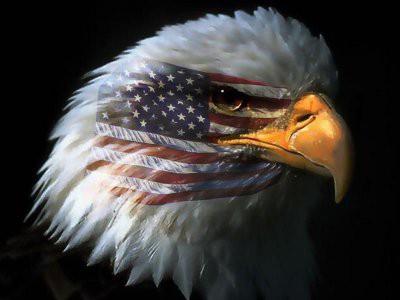
www.VigilanceVoice.com
Friday--May
2, 2003—Ground Zero Plus 597
___________________________________________________________
President Bush Beware: "All
Glory Is Fleeting!"
___________________________________________________________
by
Cliff McKenzie
Editor, New York City Combat Correspondent News
|
GROUND ZER0, NEW YORK, NY--Flocks of doves flew
into a brick wall yesterday, wings flapping wildly, feathers flying
furiously as they spiraled down into a heap of frustration.
They were scattered by the jet wash of President Bush's fighter plane
landing on the deck of the U.S. Abraham Lincoln, a bleary-eyed sight
for anyone who claims peace is more important than war in politics.
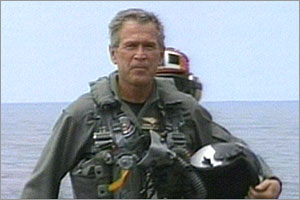 |
|
George Bush is the
first U.S. commander-in-chief to land aboard a carrier in a jet
aircraft |
Not since President Teddy
Roosevelt strapped on his pistols to review American troops has a
modern president donned a military uniform and presented himself to
the world a walking, talking military symbol of might and power, but
that's exactly what President George W. Bush did yesterday.
A former jet pilot with the Texas Air
National Guard during the Vietnam War, President Bush was the first
U.S. commander-in-chief to land aboard a carrier in a jet aircraft.
He rode in the co-pilot seat of a Viking Jet, capable of delivering
nearly 4,000 pounds of bombs upon enemy forces.
Prior to his flight, the President
practiced underwater escape techniques in the White House swimming
pool to refresh his skills in case the plane had to ditch at sea.
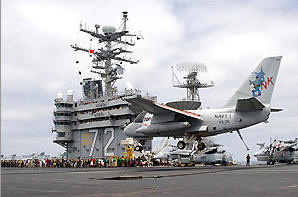
|
|
Bush landed in an S-3B Viking on the
Carrier Abraham Lincoln |
More than half of the 5,500 sailors and
Marines aboard the carrier were on the flight deck to welcome their
Commander-in-chief, one of the few Presidents ever to have "won a
war." Not since World War II has the U.S. decisively defeated an
enemy. In Korea, the war ended in a stalemate with North and
South Korea divided. In Vietnam, the U.S. withdrew its
forces. And the Gulf War ended abruptly by driving back
Iraqi forces from their invasion of Kuwait.
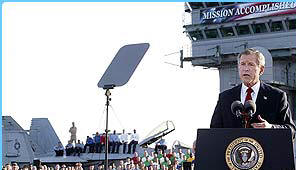 |
|
Over 2,000 sailors
and Marines welcomed their Commander-in-Chief |
Victory was claimed in both Japan and
Europe by U.S. occupations of both nations, similar to the current
status in Iraq.
However, "legally," the war has not been
declared over. As President Bush spoke, a giant "Mission
Accomplished" banner flew in the background, suggesting victory.
Politically, the United States is cautious in declaring the war finis
because the Geneva Convention requires the return of all
prisoners-of-war and the cessation of hunting down specific enemy
targets such as Saddam Hussein and his generals and Osama bin Laden.
To evade the legal issue of declaring the
war over, President Bush said, "The battle in Iraq is one victory in
the war on terror that began on September 11, 2001, and still goes on.
The war on terror is not over, yet it is not endless. We do not
know the day of final victory, but we have seen the turning of the
tide."
Critics of the President's show of military
countenance claim he is positioning himself as a "war lord" leader,
bolstering his political chips in the "combat category" for his
up-and-coming re-election campaign. They worry he is going
to pit the Democratic rivals as doves, and stretch the War on
Terrorism as the dominate U.S. issue, overshadowing the economy and
social service needs domestically.
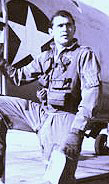
|
|
Bush:Pilot of
F-102 |
His
Vigilance, they claim, is limited to guns not butter, to bloodshed and
malevolence rather than revitalization of America as a nation of
benevolence. "He wants the world to shudder for fear it will attack."
But the lesson being heralded by the
seemingly triumphant landing of President Bush aboard the U.S.S.
Lincoln has limitations. They go back to two great warrior
images--one, General George S. Patton, and to the Roman conquerors.
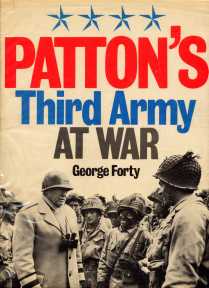 |
|
The Bush
Administration ripped a page from General George Patton's tactical
book |
In fighting the war in Iraq, the Bush
Administration ripped a page from General Patton's tactical book.
Patton skirted towns and chose not to engage the enemy at every
fortress of defense. Instead, to hasten his victories, he
sidestepped certain entrenchments and focused on the main ones,
believing he could cut off support to outlaying positions by cutting
out the heart of the enemy.
American troops followed that tactic,
charging forward to Baghdad and leaving a number of its flanks
exposed. The plan worked. By crushing Baghdad, the
rest of the country quickly fell.
Roman armies use another tactic to win wars
and intimidate enemies. They burned all their bridges as
they marched from one town to another. Legions,
six-thousand strong, upon crossing a bridge would watch their
commanders torch it, removing from the soldiers any chance of retreat.
Roman soldiers had only once choice, to be victorious since any route
of escape from battle had been expunged.
In a parallel with Rome, President Bush has
burned the bridges between the U.S. and the United Nations. By
taking unilateral action despite the restraints attempted by the U.N.
Security Council, America has removed any hedges that may have been
imposed by International forces.
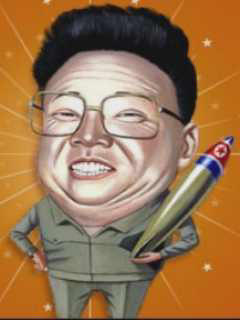 |
|
Bush's speech
included a subtle warning to Korea's Kim Il Jong |
To some, that
leaves America naked, standing alone in a world with few allies but
with a handful of massive weapons and the most surgical and powerful
military the world has ever seen. During President Bush's
speech aboard the U.S.S. Lincoln, he described how effective the U.S.
had been in limiting civilian casualties, and how adroit America was
in targeting enemy leadership with its weapons, a subtle warning to
rogue leaders such as North Korea's Kim Jong Il of America's ability
to sweep into any nation and take out its leadership in a blitzkrieg
where leadership is the primary target.
And while all the Hawks of War soar in
delight, the doves cry.
They cry out a warning.
The warning is best expressed by the final
scene in the Academy Awarded movie, Patton, when at the end of the
film the audience sees a gray-haired George C. Scott, who plays
Patton, walking his dog into the sunset after a vendor cart nearly ran
him over.
In a brilliant soliloquy defining the
hubris of all warriors, Patton is thinking aloud as he walks toward
the glowing horizon. His thoughts rush back to Roman times, when
great generals and emperors returned from war, victorious.
The city of Rome pressed along the
cobblestone streets to catch a glimpse of the victor passing by, not
unlike the crowd aboard the U.S.S. Abraham Lincoln who assembled to
hail their commander-in-chief yesterday.
George C. Scott, in his centric,
gravelling rendition of General Patton, tells the audience a story
that serves as an epilogue to the Iraqi War, and to all wars that have
ever been fought and won by warriors. It goes something like
this:
"In ancient Rome, when a great
victory was achieved, the warrior chief was given a triumphant parade
into the city. He rode in white chariot, pulled by the
finest stallions. Ahead of the victor marched prisoners,
now slaves, carrying the tribute of victory, the gold and silver and
jewels. Beside the victor, on trace horses, rode his
children, their faces gleaming as thousands cheered their father.
Amidst the din of cheers, a slave stood behind the victor, holding a
gold crown of triumph over the leader's head, and whispering softly so
that only he could hear--All Glory Is Fleeting. All Glory is
Fleeting."
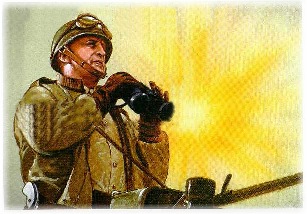
|
|
"All Glory is
Fleeting. All Glory is Fleeting." |
As I watched President Bush
exit the Viking Jet and swagger triumphant across the deck with his
flight helmet tucked under his left arm, returning salutes from the
legions waiting to pay him tribute, I thought about Roman conquerors
and the message delivered by George C. Scott in Patton.
I couldn't help but see a slave walking
behind President Bush, holding a crown over his head, whispering in
his ear: "All Glory Is Fleeting. All Glory is Fleeting."
I also could see smoke on the horizon.
It was the burning of bridges, black bilious columns rising up from
former allies who have been converted not to enemies, but to
recalcitrant, former friends who refused to come to America's side
when America had come to theirs in almost every instance of threats to
their security.
I thought of the Romans burning their
bridges, and the symbol of the U.S. floating on an aircraft carrier in
the middle of the sea, without any allies present--no sign of the
British who helped us in Iraq, or the Australians--symbolizing the
unilateral image of America as the world's hawk and everyone else a
dove of various degrees.
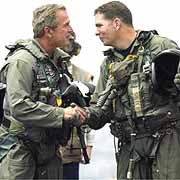 |
|
President Bush welcomed aboard the aircraft carrier |
As much as I wanted to jump up and down and cheer
on President Bush and to clutch the American Flag and wave it, I
slumped back in my chair and gave the scene some great thought.
Vigilance was the issue.
My question was: "Was the glory of victory
in Iraq a sign of Vigilance, or a fleeting example of war's glory?"
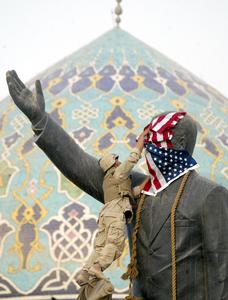
|
|
I questioned
whether the glory of victory in Iraq was a sign of Vigilance, or a
fleeting example of war's glory. |
There is no question that a
part of me wanted to cheer that America's Sword of Vigilance had
chopped off at least
one head of the Beast of Terror, and, that our actions unquestionably
have driven Terrorism into hiding--at least for the moment.
What bothered me was the danger of
presumption.
And, the burning of bridges.
First, the presumption.
I found it presumptuous of America to
tackle the Battle of Terrorism single handedly. By doing
so, the assumption is that America is the only nation capable of
delivering deadly blows to the Beast of Terror. It also suggests
that violence is the only cure to ridding Terrorism, and that America
is the only nation capable of delivering such violence.
As a warrior, I know the horrors of war
more personally than any war protestor, or any flock of doves. I
carry the blood of thousands on my hands, blood that can never be
washed away.
I know that war is the result of people's
Complacency, the sum of their surrender to politics that prey on a
public that refuses to take charge of themselves, and refuses to be
responsible for the security of their own lives, and their children's
lives.
I would have liked to have heard President
Bush call upon the nations of the world to fight Terrorism, and to
have heard him say the words, "All glory is fleeting, and we must call
upon all nations to become Nations of Vigilance, and all citizens to
become Citizens of Vigilance to fight Terrorism's Fear, Intimidation
and Complacency so that future Iraqs cannot be created, so that
future despots and tyrants cannot become Beasts of Terror using the
forces of Fear, Intimidation and Complacency to rule their people and
threaten others."
But those words were not heard.
President Bush elected to ride in the victory's chariot. I
wondered if George S. Patton was watching and scowling.
Next, is the burning of bridges.
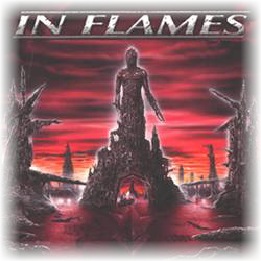 |
|
Has America
burned her bridges? |
America's unilateralism may have damaged
its opportunity to enfold other nations in support of the War on
Terrorism. By alienating many nations, especially by not
enjoining an allied presence aboard the U.S.S. Abraham Lincoln, there
was a vision that America has no allies, that it fought the war in
Iraq single-handedly.
The battle for Vigilance is a global
battle, against a Beast of Terror who knows no national borders.
We often forget that more than one-third of those who died on
September 11 at the World Trade Center were from nations other than
the United States. Terrorism respects only death and is
indiscriminate in its victimization. Since it's goals are Fear,
Intimidation and Complacency, it will assault blindly anything that
moves.
I would have been happier had the
President called upon a Global Sentinel of Vigilance Corps, a plea for
the Citizens of Vigilance in all nations to take up the Sword of
Vigilance and prepare themselves to fight not for themselves or their
countries, but to fight Terrorism for the future of the children, and
their Children's Children's Children. I believe this would have
rebuilt burned bridges, and given America not the appearance of a
Roman conquering hero storming into Rome in a chariot, but the
presence of a father concerned about his children, and grandchildren,
and great grandchildren.
I was also concerned a little about
May 1 being proclaimed "Loyalty Day." In his 2002
Proclamation for Loyalty Day, President Bush quoted Woodrow Wilson,
famous for promoting America's foreign policy to democratizing the
world. In the proclamation, President Bush stated:
President Woodrow Wilson said, "Loyalty means nothing unless it has at
its heart the absolute principle of self-sacrifice."
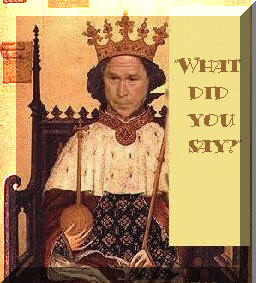 |
|
Did President
Bush hear the words "All Glory is Fleeting?" |
Self sacrifice, I believe, is not
acting in our own behalf, but for the future security of the Children
and their Children's Children's Children. It is also not
about acting alone. It is about acting as a world body toward a
common goal, not a singularly national one.
Vigilance is a goal that belongs to
the world, not to any particular nation.
While I am proud America stood up to
the Beast of Terror in Iraq, and I'm glad we set an example to the
world that action speaks louder than words, I am not necessarily eager
to promote America as the single source of Vigilance. By
doing this, we presume other nations are not as equipped as we to
fight Terrorism.
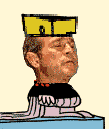 |
That isn't true. Every
human being, regardless of his or her national penchant, has Courage
to overcome Fear, Conviction to fight Intimidation, and can take Right
Actions for future generations rather than fall Complacent to the
status quo. Each citizen in the world can be a Sentinel of
Vigilance, not just Americans.
For these reasons I wonder if
President Bush heard the words of the slave standing behind him
holding the crown over his head as he marched from the Viking Jet.
I wonder if he heard: "All Glory Is
Fleeting?"
May
1--Acclivity
of Vigilance & Declivity of Terrorism
©2001
- 2004, VigilanceVoice.com, All rights reserved -
a ((HYYPE))
design

|
|
|